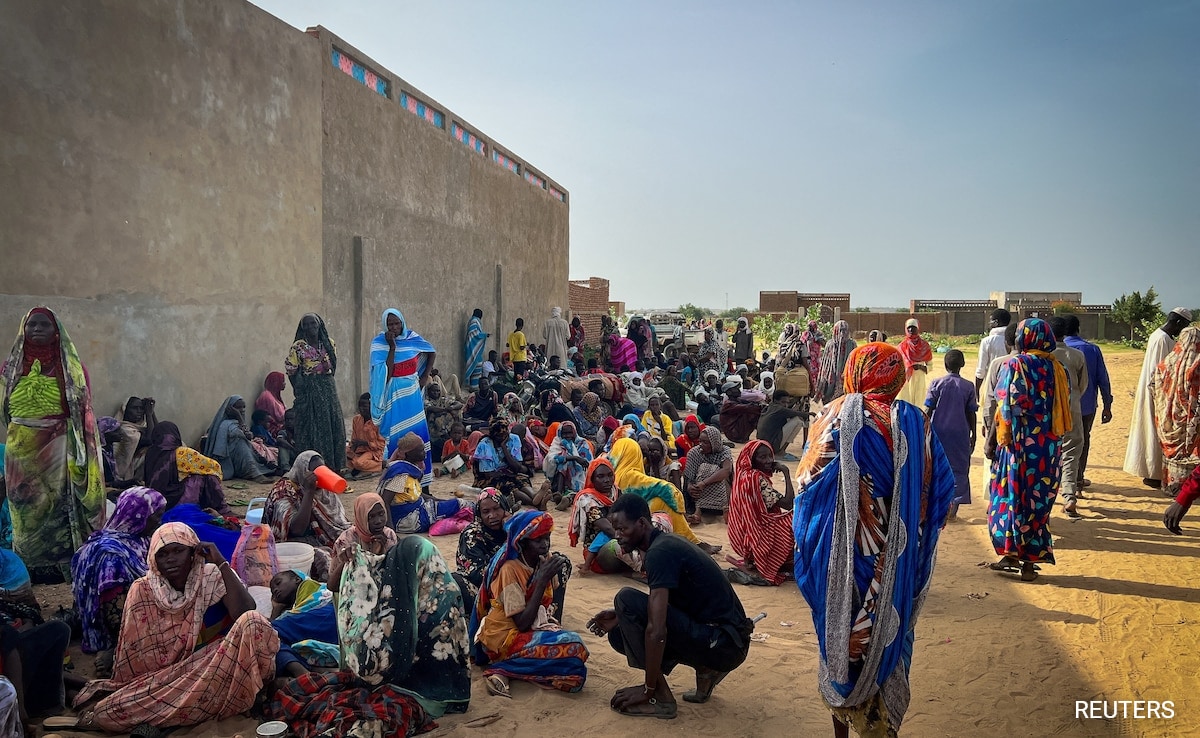
Cairo believes that newcomers can work and move “freely”.
Cairo:
Ten months after Sudan’s brutal war sent hundreds of thousands of people fleeing, many seeking asylum in neighboring Egypt face the stark choice of becoming homeless or returning at their own risk.
Single mother Rehab has been living in Egypt for seven months, fighting for her children’s lives.
“I have a daughter who was born here, but I can’t work to support her,” the 28-year-old told AFP.
Dozens of women like Rehab, who gathered in a small church in eastern Cairo, said their families were crammed into crowded apartments and that they had slept on the bare floor since they arrived.
“People come to Egypt thinking life will be better here,” Sudanese Sunday school teacher Ibram Kiir, 28, who has spent five years in Egypt helping refugees through his church, told AFP .”
“But reality sets in. They have no money, they can’t buy an apartment, it’s cold and they can’t buy winter clothes. So they go back,” he said.
More than 450,000 people have crossed the border into Egypt since fighting between the Sudanese army and the paramilitary Rapid Support Forces began in April, according to official figures.
Many told AFP their first priority was to find a safe place to lie down, even if it was just on a cold tiled floor.
But as time went on, as Egypt’s two-year economic crisis rapidly worsened, employment, adequate housing and help became all but impossible.
Just as war-weary Sudanese are beginning to pour in, soaring inflation – which hit a record high of 39.7% last year – is destroying livelihoods.
Many showed up with only their clothes on. They end up living with two or three families at a time in small apartments, many of whom have just one breadwinner and earn less than the minimum wage.
Dan Mhik Akom, 34, who works part-time as a house cleaner, tried to convince his friends that things would get better.
But after a few months, he saw his family “cannot even go to the kitchen to eat” due to overcrowding, and “he became determined to return to Sudan,” he told AFP.
“Would rather die”
Randa Hussein, another Sunday school teacher, said her cousin left Cairo in October and returned home to the war-torn suburbs of Khartoum.
Hussein, 33, said she would “rather die there than stay here.”
Her family has not heard from her since.
Hussein is now hosting another refugee, a 20-year-old mother of two who had been living with her grandmother until the landlord threatened the older woman with the death of the new arrivals if they did not leave. will be expelled.
Unable to find a job or an apartment, “she insisted on returning to Sudan,” Hussein said.
“She had a one-year-old that she couldn’t feed. She didn’t know what to do.”
In Sudan, however, the situation is no better: Her Khartoum neighborhood has been bombarded beyond recognition, and the surviving houses are packed with militants.
“People are forced to choose between homelessness and insecurity,” said Sudanese political economist Raja Makkawi.
“They cannot withstand the harsh conditions in Egypt and therefore choose to return, preferring to negotiate their security with the militants,” she told AFP.
For several Sudanese interviewed by AFP, the threat of homelessness looms.
Hawa Talfon, a missionary’s wife, was kicked out of her home with two weeks’ notice for hosting too many displaced family members.
She lived in their home in east Cairo for five years before her brother’s family fled the war with her.
“What should I do? Kick them out?” she asked after the landlord turned against her guests.
‘burden’
AFP has learned that dozens of Sudanese families across Cairo are facing the same fate, with landlords citing “excessive wear and tear” on their properties, among other reasons.
Human rights groups and Sudanese living in Egypt have warned of rising anti-refugee sentiment in the shadow of a nationwide financial crisis.
Yasser Ali, 40, who came to Cairo in 2002 to study law, told AFP that in the past year, “everything has changed and people’s attitudes have become more radical.”
Noor Khalil, founder of the Egyptian advocacy group Refugee Platform, said there was “a concerted campaign based purely on misinformation to blame the most vulnerable in society for the current economic crisis.”
Last month, the government said it would audit how much Egypt’s “guests” – which it calls nine million refugees and migrants – are costing the country.
Khalil and other rights activists around the same time saw an increase in social media posts labeling refugees a “burden,” even though most receive little U.N. or government aid.
Cairo believes that newcomers can work and move “freely”.
Rents in Cairo have soared as the economic crisis worsens, but rights groups and Sudanese have told AFP that landlords are specifically targeting Sudanese residents.
“You either pay, or they find someone who’s willing to pay,” Kiel said. Some families, like Talfang’s, were given a different ultimatum: Get rid of “your own flesh and blood,” or leave.
The war intensified and people had no choice.
“We can’t go back, we can’t move somewhere else, we can’t stay here,” Ali said at a Sudanese community center in Cairo, which also faces the threat of eviction.
(Except for the headline, this story has not been edited by NDTV staff and is published from a syndicated feed.)
Follow us on Google news ,Twitter , and Join Whatsapp Group of thelocalreport.in













